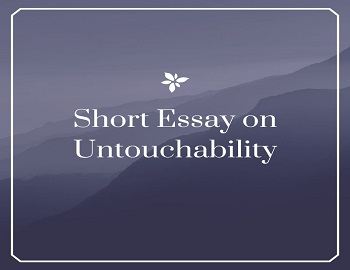Untouchability:
Since ancient times, Indian society has practized the caste system. There are four castes. The Brahmins stand at the top. They were teachers and advisors to the king. Then came Kshatriya who were warriors and kings. Those dealing in trade were called Vaishyas. Those indulging in farming and manual work were called Sudras. The caste system originated in the need for division of labour. So, there were no strict rules in beginning. There are many persons who rose to the upper classes by dint of the profession they adopted. Vishwamitra was born in a Kshatriya family but became a Brahmin through mediation. He came to be known as Maharishi.
But, with the passage of time, the caste system became very strict. Caste came to be determined by birth and not by profession. One born to Brahmin parents became a Brahmin, no matter what is his profession. Thus, those born in low castes came to be looked down upon. This gave birth to mutual hatred. The people of the upper classes came to regard those doing humble work as untouchables.
It is not known when the practice of untouchability began. But this practice is very old. The untouchables are kept at a distance by the members of the higher castes. They are not allowed to draw water from the common village well. They are not allowed to visit temples. They are not allowed to share tables at a hotel. They are not allowed to sit nearby. They are not even allowed to cast their shadow on persons of higher castes. In a nutshell, they are given very inhuman treatment. In the South and East of India, the problem of untouchability is very acute.
Untouchability is a blot on the fair name of India.
Many social and religious reformers in India have spoken against this evil. Raja Ram Mohan Roy was the first Indian social reformer in modern times to speak against untouchability. Swami Dayanand preached vehemently against this practice. Mahatma Gandhi continued efforts throughout his life propagating against this evil. He mixed with them, dined with them. He made every effort to raise their status in society. It is he who called them Harijans, the off-springs of God.
The government of India has passed a law against untouchability. Any person indulging in its practice can be prosecuted.
But, we find that law alone is not enough. We should make consistent and rigorous efforts to weed out this evil. We should educate the people. We should raise public opinion against this evil practice that divides a man from another man.









Comments (No)